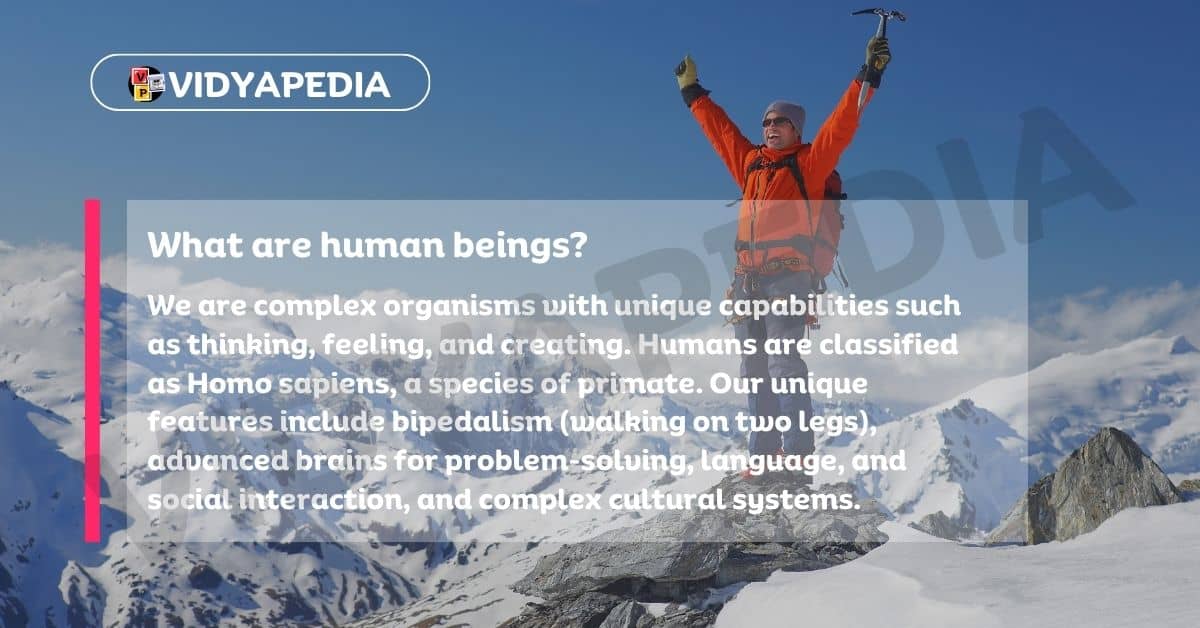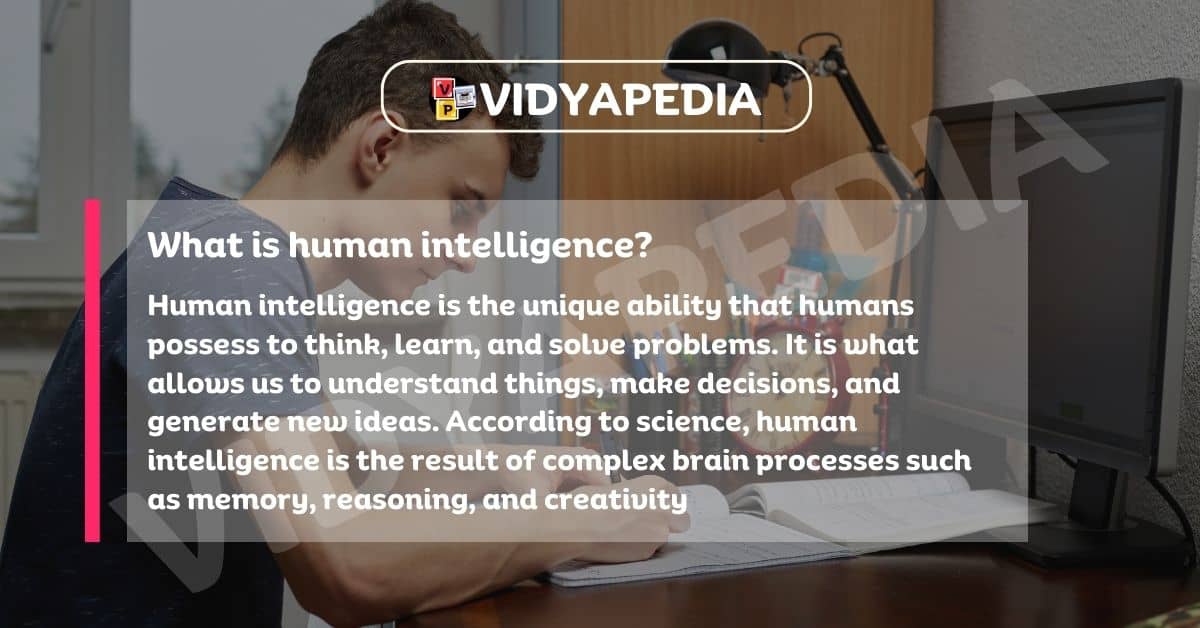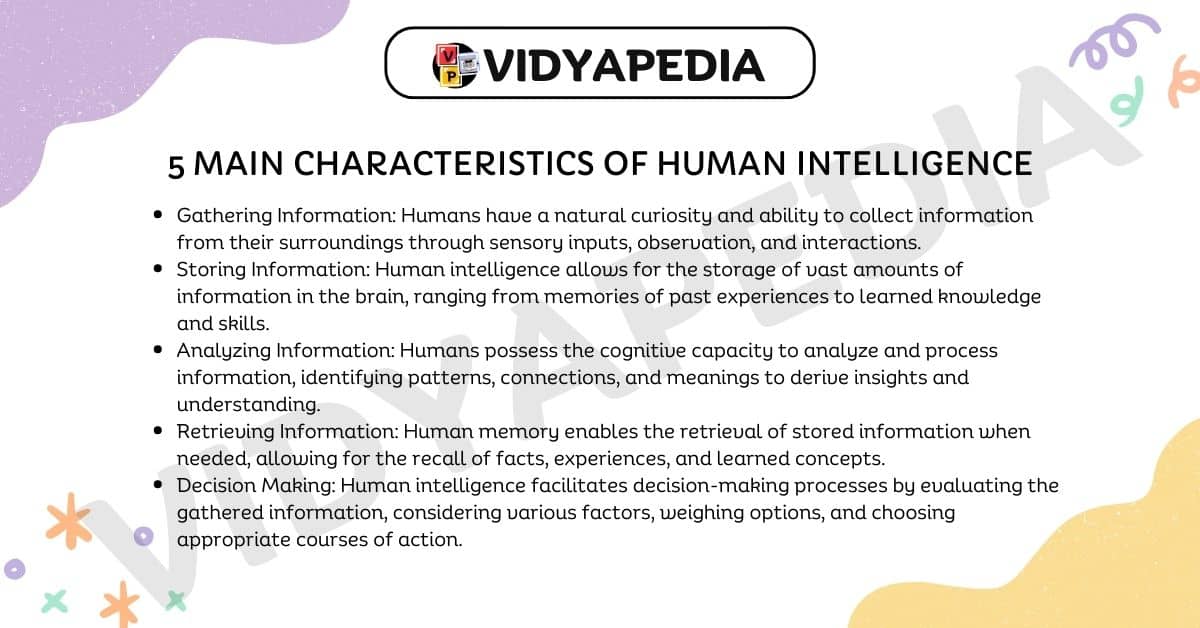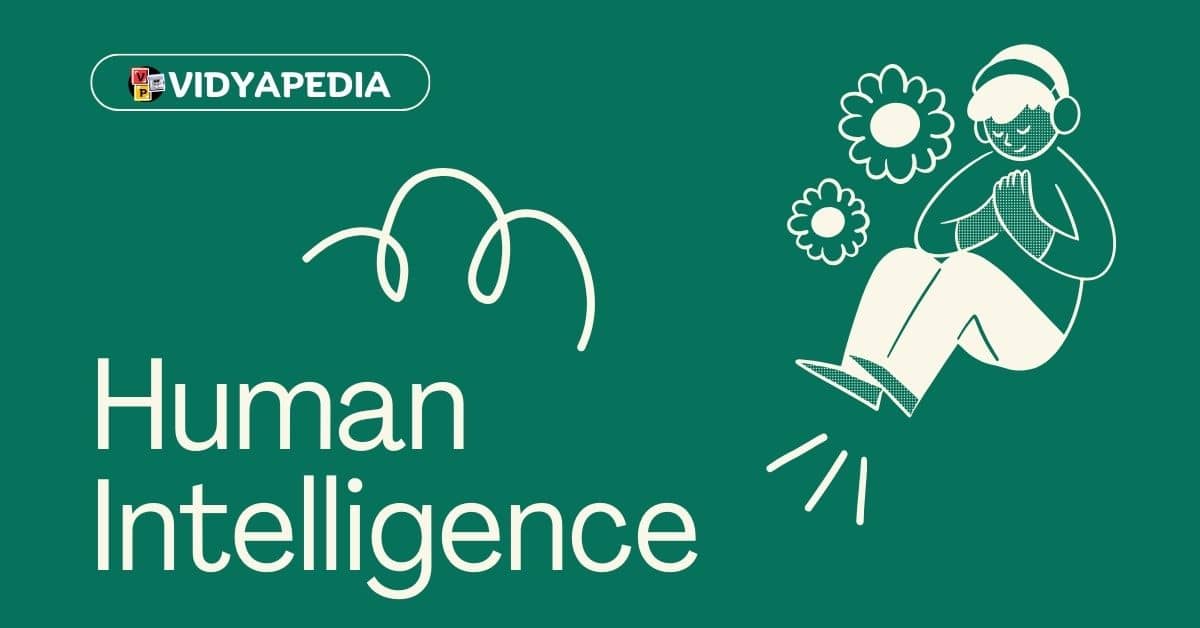What are human beings?

In simple terms, we are all members of the human Beings. We are complex organisms with unique capabilities such as thinking, feeling, and creating. Humans are classified as Homo sapiens, a species of primate. Our unique features include bipedalism (walking on two legs), advanced brains for problem-solving, language, and social interaction, and complex cultural systems. We are also known for our diverse appearances, including skin colour and facial features. Humans have evolved to adapt to a variety of environments around the world, demonstrating resilience, creativity, and the ability to learn and innovate throughout history.
Read About Robotics
What is human intelligence?

Human intelligence is the unique ability that humans possess to think, learn, and solve problems. It is what allows us to understand things, make decisions, and generate new ideas. According to science, human intelligence is the result of complex brain processes such as memory, reasoning, and creativity. It enables us to learn from our experiences, communicate with others, and adapt to changing circumstances. Human intelligence, unlike that of other animals, is diverse, allowing us to excel in a variety of fields such as math, art, and music. Overall, human intelligence is what distinguishes us and enables us to accomplish such incredible feats!
5 Main Characteristics of Human Intelligence

Sure, here’s a brief explanation of those characteristics brought about by humans:
- Gathering Information: Humans have a natural curiosity and ability to collect information from their surroundings through sensory inputs, observation, and interactions.
- Storing Information: Human intelligence allows for the storage of vast amounts of information in the brain, ranging from memories of past experiences to learned knowledge and skills.
- Analyzing Information: Humans possess the cognitive capacity to analyze and process information, identifying patterns, connections, and meanings to derive insights and understanding.
- Retrieving Information: Human memory enables the retrieval of stored information when needed, allowing for the recall of facts, experiences, and learned concepts.
- Decision Making: Human intelligence facilitates decision-making processes by evaluating the gathered information, considering various factors, weighing options, and choosing appropriate courses of action.
These capabilities showcase the complexity and versatility of human intelligence in processing and utilizing information for various purposes.
We have some more extra characteristics from humans, as explained below
- Creativity: Humans have a unique ability to think creatively, generating new ideas, solutions, and inventions by combining existing knowledge in innovative ways.
- Adaptability: Human intelligence enables us to adapt to changing environments and circumstances, adjusting our behavior, strategies, and goals based on new information and experiences.
- Communication: We possess sophisticated communication skills, including language use, non-verbal cues, and the ability to convey complex ideas, emotions, and intentions effectively.
- Emotional Intelligence: Human intelligence involves understanding and managing emotions, as well as empathizing with others, fostering social connections, and navigating interpersonal relationships.
- Critical Thinking: We can engage in critical thinking, questioning assumptions, evaluating evidence, and making informed judgments or decisions based on logical reasoning and analysis.
Regular tasks And Special tasks of human beings based on their intelligence
These tasks showcase the diversity of activities that humans engage in, from everyday routines to specialized operations, contributing to personal growth, professional success, and advancements in various fields and industries.

Regular Tasks:
- Routine activities such as waking up, eating meals, and going to bed.
- Personal care tasks like bathing, grooming, and dressing.
- Attending classes, completing homework, and studying for exams (for students).
- Job responsibilities, meetings, and professional development (for working adults).
- Cooking, cleaning, laundry, and grocery shopping (household chores).
- Exercising, visiting healthcare professionals, and taking medications as prescribed (health maintenance).
Special Tasks:
- Playing musical instruments, painting, programming, or speaking multiple languages (specialized skills).
- Writing novels, composing music, designing artwork, or developing innovative solutions (creative endeavors).
- Engaging in performances, competitions, or exhibitions in sports, arts, or academic contests (performance and competition).
- Leadership roles, organizing events, managing projects, or initiating community initiatives (leadership and organization).
- Pursuing personal development goals, volunteering, traveling, or pursuing hobbies and interests (personal development).
Specialized Operations:
- Performing cardiac surgeries such as bypass surgery, heart valve repair, or heart transplant (cardiology).
- Designing and overseeing the construction of complex structures like bridges, skyscrapers, dams, and tunnels (structural engineering).
- Designing, testing, and launching spacecraft, satellites, and aircraft (aerospace engineering).
- Developing medical devices such as artificial organs, prosthetics, imaging equipment, and biomedical sensors (biomedical engineering).
- Handling complex legal cases such as litigation, corporate law, intellectual property disputes, and international law (legal practice).
- Conducting experiments, analyzing data, and publishing research findings in various scientific fields (scientific research).
- Choreographing dance performances, composing music, directing theatrical productions, and creating visual effects (performing arts).
- Developing software applications, designing cybersecurity systems, managing databases, and implementing network infrastructure (information technology).
Frequently Asked Question (FAQ)
What are regular tasks, and why are they important?
Regular tasks are daily activities like eating, studying, and working. They’re crucial for maintaining health, routines, and meeting basic needs.
What are special tasks, and how do they differ?
Special tasks are unique activities requiring specific skills, like playing instruments or performing surgeries. They challenge us to develop creativity and expertise.
Can you give examples of regular tasks?
Examples include personal care, education, chores, health maintenance, and job-related activities.
What are examples of special tasks in different fields?
Special tasks vary by field, like surgeries in medicine, designing structures in engineering, or creating music in the arts.
How do regular and special tasks contribute to growth?
Regular tasks establish routines and maintain health, while special tasks develop skills, creativity, and expertise for personal and professional growth

